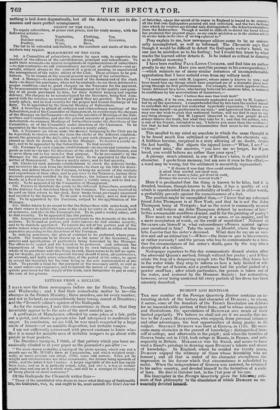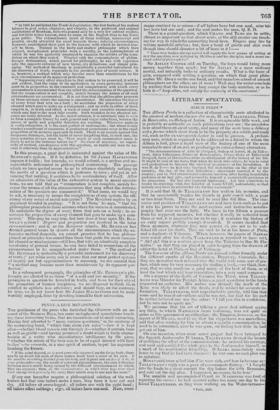DUMONT AND BENTHAM.
THE new number of the Foreign Quarterly Review contains an in- teresting sketch of the history and character of DUMONT; to whom, it seems, some of the founders of the French Revolution are debtors for no inconsiderable portion of their fame, and to whose arrangement and illustrations, the speculations of BENTHAM owe much of their limited popularity. We believe we shall not err if we ascribe this no- tice to Sir JAMES MACKINTOSH, who enjoyed, from personal intimacy and other advantages, the best opportunities of doing justice to its subject. STEPHEN DUMONT was born at Geneva, in 1759. He over- came many obstacles in the pursuit of knowledge ; distinguished him- self at college, and afterwards in the pulpit ; and when the troubles of Geneva broke out in 1782, took refuge in Russia, in France, and sub- sequently in Britain. MIRABEAU was his friend, and seems to have used a friend's privilege in drawing upon DUMONT'S talents and stores of knowledge. In England, where he resided for twenty years, DUMONT enjoyed the intimacy of those whose friendship was an honour and all that is stated of his character strengthens the -impression in his favour which that circumstance is calculated to make. When the independence of Geneva was restored, he returned to his native country, and devoted himself to the formation of a code of laws. He died in October last, in the 71st year of his age. His biographer in the Foreign Quarterly gives the following esti- mate of that philosophy to the elucidation of which Thaw= so un- weariedly devoted himself. " In 1801 he published the Traite de Legislation ; the first fruits of his zealous labours to give order, clearness, and vivacity, to the profound and original meditations of Bentham, hitherto praised only by a very few patient readers, and but little better known, even by name, to the English than to the Euro- pean public. The extraordinary merit of these writings, manuscript and printed, chiefly attracted his mind towards them ; inferior circumstances, however, contributed their part to the fervour with which he devoted him- self to them. Trained in the hasty and shallow philosophy which then reigned, metaphysical principles were a novelty, in the contemplation of which he was too agreeably employed to examine the solidity of the foun- dation on which they rested. Wearied with the commonplaces of philan- thropic declamation, which passed for philosophy, he ran with eagerness into the opposite extreme of new terms, dry definitions, and simple prin- ciples. The method of Bentham is undoubtedly a powerful instrument for the discovery of truth, especially in the juridical part of moral science. It is, however, a method which may become more than mischievous by the very circumstance of its apparent perfection. " Supposing every other objection to that system to be answered, it will be still evident, that the value of its application in every particular instance must be in proportion to the exactness and completeness with which every circumstance is enumerated that can affect the determination of the question. But the enumeration is not complete, merely because the names of all such circumstances are enumerated. It is not thus that the philosopher proceeds in those sciences where the success is uncontested. He calculates the degree of every force that acts on a body ; he ascertains the proportion of every element which goes to make up a compound ; and an error in either of these respects is, in truth and effect, a want of exact and complete enumeration, which may lead to the most false results. SuCh mistakes in the physical sci- ences are easily detected. In-the moral sciences, it is extremely easy to seem to form a complete theory by such general and vague inductions, because the means of quick and palpable detection are wanting. Wherever analysis is really exhaustive, it is the most perfect of instruments ; but where it only reaches a semblance of exactness, it produces or perpetuates error in the exact proportion of its seeming approach to truth. There is no remedy against this dangerous distemper, but the habit of never forgetting that, in each case, the main question always must he, How much of each enumerated cause is likely to act in the instance before me ?' No show of accuracy, no superi- ority of method, can dispense with this question, or enable any man to an- swer it otherwise than by approximation."
In this passage, a great deal is insinuated against the value of Mr. BENTHAM'S system. If it be defective, let Sir JAMES MACKINTOSH
impugn ; but inuendo, we would submit, is a useless and un- warrantable instrument in philosophical controversy. The passage which we have quoted seems to us to advance absolutely nothing on the merits of a question which it professes to raise ; and yet in ad- vancing, that nothing, it contrives,to be contradictory of itself. After an admission of the value of the exhaustive system in moral specula- tions, we are told that an " enumeration is not complete, merely be-
cause the names of all the circumstances that may affect the determi-
nation of the question are enumerated." -What more, we would be to ask, is necessary to insure the completeness of any system, the effi- ciency of any series of moral categories ? The Reviewer replies by an
argument founded in analogy. " It is not thus," he says, " that the philosopher proceeds in those sciences where the success is uncontested.
He calculates the degree of every force that acts on a body ; he as- certains the proportion of every element that goes to make up a com pound." This may be very true, but how does it bear upon. Mr. BEN-- TiIAM'S system ? Degree and proportion are involved in the term circumstances ; and if, as the Reviewer admits, Mr. BENTHAM has devised general terms to denote all the circumstances which the ex-
haustive method demands, we connot perceive that he has. philoso- phized on principles less sound than those that guide the most success- ful chemist or mechanician—still less, that with an admittedly complete vocabulary of general terms, he can have failed to enumerate all the circumstances to be comprehended under these. " The method of Mr. BENTHAM is undoubtedly a powerful instrument for the discovery of truth ;" yet while every one is aware that our most perfect systems of inquiry are but approximations to accuracy, we are assured that " a method may become more than mischievous by its apparent per- fection."
In a subsequent paragraph, the principles of Mr. BENTHAM'S phi- losophy are alluded to as those " of a cold and low morality." It' the principles in question be founded in truth, and have for their object the promotion of human happiness, we are disposed to think them entitled to epithets less offensive ; and should they, on the contrary, be false, we do not know how Sir JAMES MACKINTOSH can be more worthily employed, than by devoting himself to their subversion.



















 Previous page
Previous page